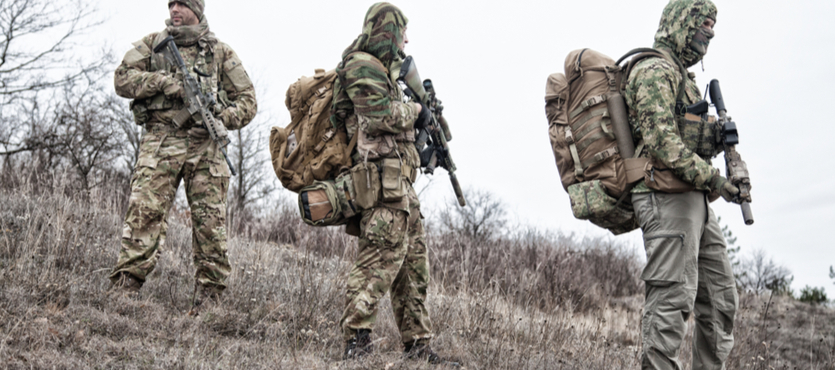As the shadowy Russian mercenary organization spreads its tentacles throughout Africa, reports are pouring in of gross human rights abuses.
According to eyewitnesses, Wagner Group fighters massacred about 300 civilians in Moura, a central Malian village. It was not an isolated incident. “There are quite a lot of eyewitness accounts on the presence of White soldiers speaking an unknown language,” remarked Héni Nsaibia, senior researcher at the Armed Conflict Location and Event Data Project. Sources claim that between 800 and 1,000 mercenaries are currently in Mali, at a cost of around $10 million a month. Satellite images and flight logs confirm some of these allegations.
The Malian government admits it hired Russian instructors, but denies they are mercenaries. Kremlin spokesman Dmitry Peskov echoed this denial, claiming “We have nothing to do with the activities of private military companies abroad.”
Wagner Group mercenaires have also been linked to atrocities elsewhere in Africa. Reportedly, these fighters rigged toys with explosives in Libya and sexually assulted women and girls in the Central African Republic.
Situation in Mali
Back in the 1800s, most Europeans, including most political leaders, knew almost nothing about the people who lived in Africa, but they did not hesitate to carve up its territory among themselves.
Mali, a former part of French West Africa, is almost twice as big as Texas. However, most of the country’s 19 million people live crowded together in the Senegal River basin, which is in the extreme southwest. Government assistance programs, including basic utility services, are largely unavailable elsewhere. Additionally, two-thirds of Malians are under 25.
This combination makes the vast swaths of rural Mali ripe for Islamic revolution. That is especially true since the country is almost exactly on the line between mostly Muslim north Africa and mostly Christian south Africa.
In the Middle Ages, Mali was the center of a vast African empire which was larger and richer than anything in Europe at the time. The glory days ended, as they usually do, and Mali fell under French influence. Since independence in 1960, a revolving-door military dictatorship has ruled Mali, at least for the most part.
In 1991, voters approved a new constitution and Mali briefly became a plural democracy. Rebel activity began in 2012, not coincidentally around the time a military junta seized control of the country yet again. Rebel infighting and French intervention crushed that rebellion.
For a few years, Mali was on the straight and narrow. Then, you guessed it, another military strongman overthrew a democratically-elected regime. Once again, regional violence followed.
This time, instead of turning to France for help, Mali turned to Russian mercenaries. The outraged French withdrew their military forces from Mali in March 2022. The Malians responded by declaring that France had breached its military assistance treaty, and the environment continues deteriorating. Meanwhile, no one is minding the store, and some Wagner Group fighters appear to be taking advantage of that situation.
Contractors vs. Mercenaries
Accountability and transparency are two of the biggest differences between mercenaries and private military contractors.
Mercenary organizations, like the Russian Wagner Group, are not part of the country’s military apparatus. At the same time, they are not private companies either. Therefore, neither government nor civil rules apply to them. That is especially true since most non-U.S. countries do not have a truly independent judicial system. Judges are tied to the other branches of government, at least financially.
American private military contractors are accountable for their actions which occur in the fog of war. The controversial Nisour Square incident in 2007 is a good example. For reasons that remain unclear, private military contractors opened fire in Baghdad. A dozen people died and many more were injured. Several Blackwater contractors were sent to prison. Former President Donald Trump pardoned those individuals.
Transparency, or the lack thereof, is another issue. Organizations like the Wagner Group operate in the shadows. No one is even sure who runs this organization. Speculation is that group of neo-Nazi former Russian military officers run it. Hence, the reference to Richard Wagner, one of Hitler’s favorite composers.
In contrast, American private military contractors are completely transparent. Anyone with a few minutes, a curious mind, and an internet-enabled device can learn about these companies in mind-numbing detail.
Injury Compensation Available
When regular servicemembers are injured overseas, the VA disability system often provides medical care and financial compensation. When private military contractors are injured overseas, the Defense Base Act replaces lost wages and pays medical expenses. Let’s look at these areas in detail.
The injured contractor can work for any government agency, such as the Department of Defense or the State Department. Non-military contractors, like Peace Corps volunteers, might also be eligible for such benefits. Additionally, some contractors who work for some sympathetic foreign governments are likewise eligible for benefits.
The overseas area must be a war zone. U.S. law defines this phrase very broadly. Any territory with any U.S. military presence, even a single military attache in a consulate, usually qualifies as a war zone.
Finally, the DBA only applies to physical injuries. This injury could be a trauma injury, like a broken bone or PTSD, or an occupational disease, like a toxic exposure illness or a repetitive stress injury.
For more information about DBA benefits, contact Barnett, Lerner, Karsen, Frankel & Castro, P.A.

